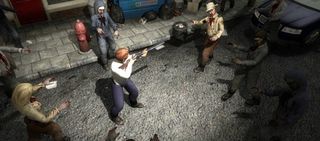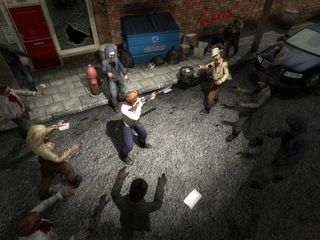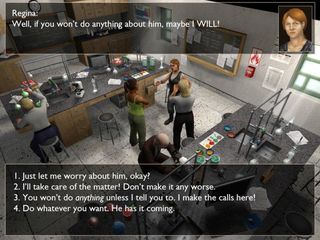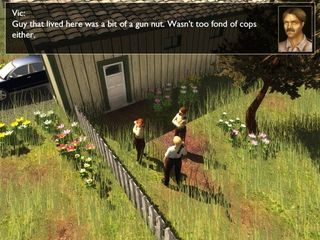Dead State preview

"I've always been horrified by the 'zombie emergency plans' that people come up with. Many involve obscure ninja weaponry. Those people will probably be the first casualties of the zombie apocalypse.”
Brian Mitsoda says gaming just doesn't “get” zombies. His criticism, in plain nerd-English: “Most of the games that use zombies have nothing to do with the zombie genre.” I'd agree—the best zed fiction isn't about the bullet-frenzy sprint from saferoom to saferoom, it's about preparation and survival under pressure through cooperation: maintaining barricades, rationing food, managing the morale of teammates and fending off fellow humans that want what you've got.

As project lead at DoubleBear Productions, that's precisely the experience Mitsoda wants you to have in Dead State : a zombie game with isometric, turn-based RPG combat similar to Fallout and Fallout 2 paired with X-COM's base management. You're the leader of a group of survivors that've holed up in Splendid Elementary School in Texas. Upgrading the school is essential to survival—like your base in X-COM, it's the source for facilities and production. “If you want to start building thrown weapons, you're going to need a lab. A garden will increase food supply by a minor amount per week. An infirmary will make wounded allies heal faster,” says Mitsoda.
To do all that, you'll need to bring back survivors from surrounding towns. You can choose to recruit them, trade with them, exploit them or remove them from your party if they outlive their usefulness. “A lot of allies are not good at combat. But they will all have some value—some having unique perks that give bonuses to things like speed of production of certain kinds of items. The more people in the shelter, the more people you have to work on upgrades and projects. Of course, this means having more food for them, which in turn leads to more exploration for resources.”

A janitor may only bring a mop to your cause, but he'll boost morale. A science-smart character may be able to create a noise-making device that lures zombies to it. But because Mitsoda is keen on making Dead State as open-ended as possible (your expeditions can travel nearly anywhere on the large map from the game's outset), you're not committed to cultivating any particular characters. “You may determine their skills are no longer worth the effort to keep them around,” Mitsoda says. In Mass Effect 2 terms—think about having the freedom to shove Miranda out the airlock on a whim after she spilled your coffee.
How you respond to the apocalypse is up to you, Mitsoda emphasizes. “You might find out while playing that you're kind of a ruthless person. When there are problems at the shelter, you simply have to make tough decisions. You may like an ally, but realize that if you had to give out the last of the antibiotics (which keeps infected allies from becoming undead) you might give it to the [expletive] because he's a great shot. This is a life-or-death situation we're portraying. There's definitely room for players to be the biggest threat to the game world. We're OK with that.”

Mitsoda also wants combat to drive players' decision-making. You'll only have direct control of your main character when fighting—if your prized companion (say, a lady commando) is paralyzed with panic during a zombie ambush, she might flee or try to heal herself constantly. Panicking allies won't accept your orders—how (or if) you'll save them is up to you. Noise is also a concern during combat, forcing you to weigh the silent-but-dangerous risks of close-combat with the powerful—but attention-attracting—benefits of a pistol.
PC Gamer Newsletter
Sign up to get the best content of the week, and great gaming deals, as picked by the editors.
Even if it didn't have zombies, I've waited at least a decade to play a modern game with X-COM's mechanics commingled with a few of the original Fallout's RPG sensibilities. Bring on Dead State.

Evan's a hardcore FPS enthusiast who joined PC Gamer in 2008. After an era spent publishing reviews, news, and cover features, he now oversees editorial operations for PC Gamer worldwide, including setting policy, training, and editing stories written by the wider team. His most-played FPSes are CS:GO, Team Fortress 2, Team Fortress Classic, Rainbow Six Siege, and Arma 2. His first multiplayer FPS was Quake 2, played on serial LAN in his uncle's basement, the ideal conditions for instilling a lifelong fondness for fragging. Evan also leads production of the PC Gaming Show, the annual E3 showcase event dedicated to PC gaming.
Most Popular


